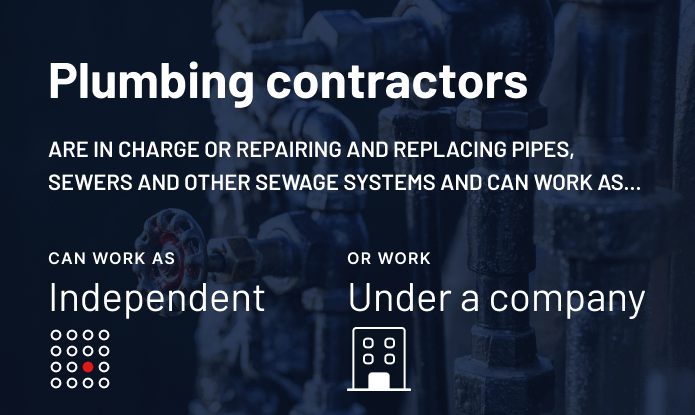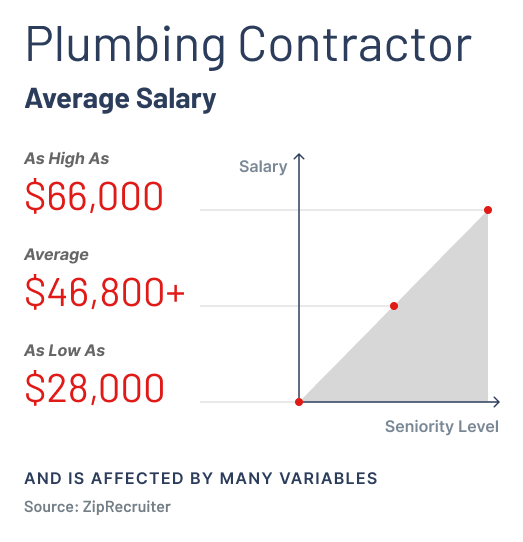The construction industry has a wide range of jobs available with good pay. Plumbing contractor jobs are one of them. As a plumbing contractor, you carry out related services ranging from installing to repairing and replacing pipes, sewers, and other sewage systems.
Plumbers can either work under a company collecting an average salary or work as independent plumbing contractors, charging customers per hour. Irrespective of the work model, the career path can still cover the cost of living for an average individual in San Francisco, California, West Virginia, Alaska, San Diego, or any other city.

That implies that working with a reputable company or client that can pay the regular plumber’s salary can help an average plumbing contractor earn a meaningful living in any of these states, especially in Texas, as the job opportunities are countless and well paid enough. Available plumbing contractor jobs vary depending on certifications or education level, which also determines the average base salary a contractor can earn.
What is the average salary for a plumbing contractor in the United States?
The average salary for plumbing contractor jobs can vary within the U.S. Although, states like San Diego and California have similar salary ranges. The most important thing to consider is the national average base salary, which is about $46,800+ according to the available data on top recruitment sites like ZipRecruiter.

According to this data, a plumber’s salary can be as high as $66,000 and as low as $28,000. With the wager per hour ranging between $23 – 26. This information shows that plumbers usually have one of the highest salaries in the construction industry. In contrast, entry-level plumbing contractors settle for lesser wages per hour.
Different factors affect the base salary and earning rates a plumbing contractor receives from his job per hour. We look into them below:
Experience Level
The level of experience affects the median salary greatly. Plumbers with 10+ years of experience receive higher wages than entry-level plumbers. The difference in pay can be so huge that it will cover an entry-level plumber’s salary twice. To earn more per hour, a plumbing contractor will need to extend the working hours or train himself on specific skills that will increase the plumbing contractor’s job value.
Job Title/Niche
There are different plumbing contractor jobs and subcategories. The career path you choose determines how well your median earnings can cover your cost of living. Commercial plumbers earn more than residential and service plumbers. A master service plumber makes more than a journeyman plumber, and the trends continue that way.
Skills/Educational Level
While experience is about the duration of time you’ve been on the job, skills are more about how well you can handle a plumbing project and your profound knowledge as a plumbing contractor.

The higher your skills or educational level, the more you earn per hour. Plumbers with a high school diploma earn lower rates than those with certifications as master plumbers. Thus, any plumbing contractor that wishes to gain more must be conscious of improving their skills and knowledge.
The Company
The salary a plumbing contractor earns can depend widely on its employers. Some companies in low-labor productive states usually offer fewer salaries compared to other employers that are full of work. Comparing the different companies’ salary is crucial before choosing the one to work for.
Location
Companies’ locations determine the average pay plumbers earn. As mentioned above, salary differs from city to city. Employers’ cost of running the business, availability/unavailability of much competition, demand rates, ease of accessibility to needed materials, etc., are factors that enable location to influence an average plumber’s salary.
Conditions of Related Industries
Some companies consider hiring costs for related jobs when setting plumbers’ salaries. Ideally, it’s expected that the same factors would affect plumbing and other similar jobs. As such, employers may try to emulate similar industries’ wage structure.
Business Structure
Some plumbers work under a reputable company, while others are self-employed. A self-employed plumbing contractor might choose to run a one-person business or hire employees. Each of these business models generates a different revenue volume, and whichever one the contractor opts for will affect expected income.
How to become a plumbing contractor?
Becoming a plumbing contractor requires training to obtain the needed skills, apprenticeship to gain knowledge, and motivation to search for a job or establish your own. You must have undergone each phase before being qualified to handle this job.
The benefits of being a plumbing contractor
Compensation and reward are essential things to expect from every job, and plumbing doesn’t fall short of that. Apart from the salary, most companies give bonuses, policy protection (workers’ compensation), training opportunities, and other perks.

Furthermore, plumbers have the liberty to work in various niches and can specialize in certain areas. It is a high-demand job, and every construction project (commercial or residential) requires the service.
Conclusion
The compensation and salary offered to plumbing contractors usually varies with locations, companies, and other factors. Thus, a contractor in the U.S. must consider, which affect the salary mentioned above. It’s equally important to carry the right plumbing liability insurance policy for protection against possible financial losses to claims, property damage, and injuries. Contact us today and get an easy and affordable quote in just 5 minutes!
